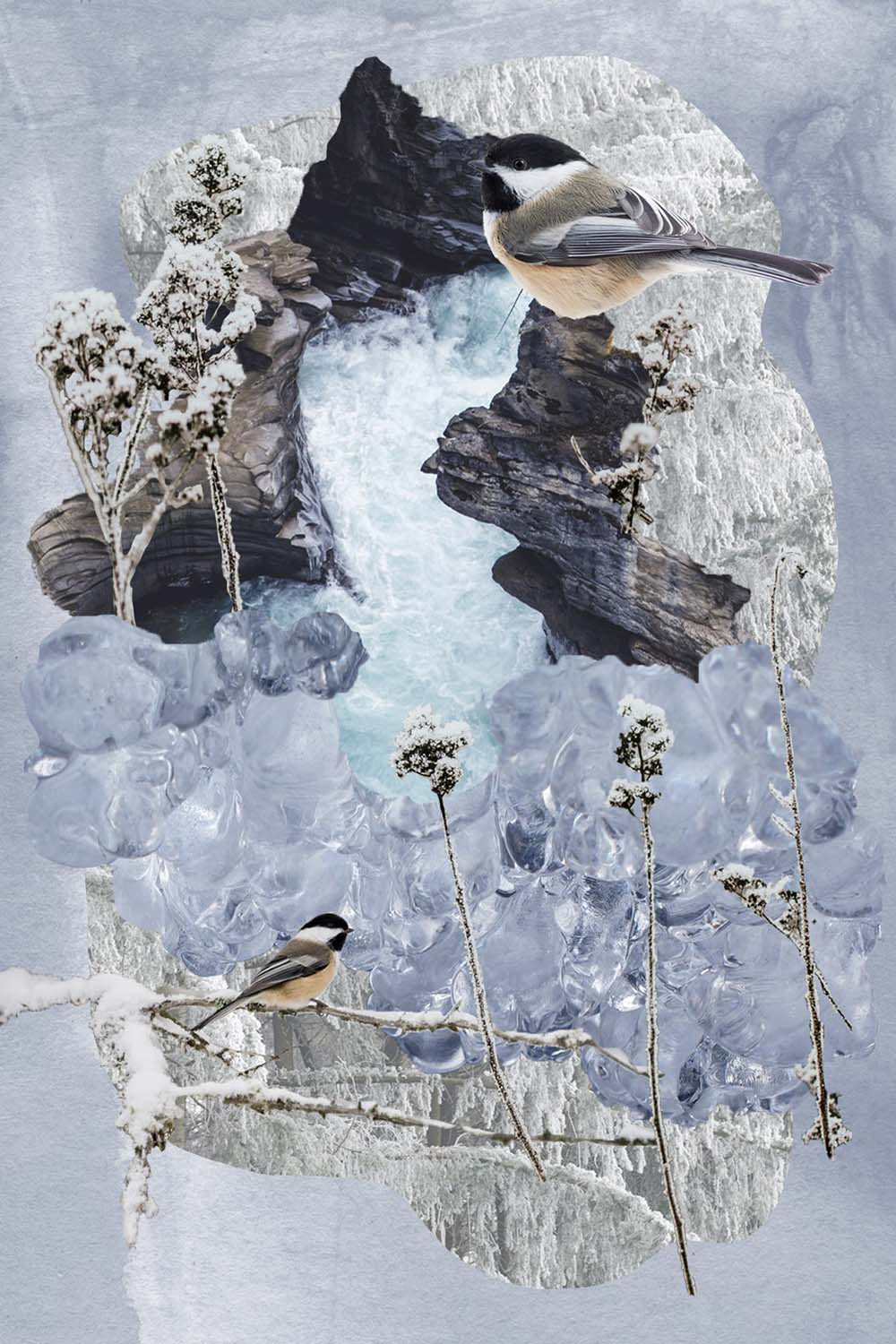
Adriana Oniță
Landing in Edmonton, December
“Invent new words for the way light / shimmers on fresh snow.”

Collages by Maia Grecco
What a desolate landscape, says the passenger in 17A. It is already dusk. Red-ochre solstice stretches over bright blue snow, five thousand feet below. Wolf Willow, Wedgewood, Whitemud Ravine. Go deep. Balance on creek ice like a kid. Glisse.
Praise the thickness of ice, the gurgle beneath. The boreal chickadee, tufa springs, tiny orchids, resting. Shed the words dreary and dismal from your vocabulary. Invent new words for the way light shimmers on fresh snow. How do you say snow sifts through spruce branches, in your mother’s tongue? Cerne zăpada. In winter, we reclaim lost languages.
Continue to our river, kisiskâciwani-sîpiy. Apricot light warms the river valley. Paint with snow on goldenrod easels. Slow. Allow your fingers and thighs to numb, thaw, throb. Remember you have a body. Rest on the clay cliffs by the balsam poplars. Laisse ton corps feel the interminable joy of sky, le ciel de l’Alberta—the one we long for when we leave acasă, untranslatable. Why don’t you stay the winter.
To view this poem in its intended form, we recommend opening this page on desktop.
This poem is based on a true story. It was solstice and I had the window seat. My mother was beside me. It was one of the most striking sunsets I had ever seen, so I was shocked to hear the passenger behind me use all the “d” words to describe the landscape: desolate, dreary, dismal, depressing, dark, deserted. To me, Edmonton is anything but these words. It is full, bright, vivid, luminous, lively, brilliant.
To suggest that the land is barren or empty couldn’t be further from the truth. amiskwaciwâskahikan has been a vibrant meeting place for millennia. Indigenous peoples—including the Nêhiyawak, Anishinaabe, Niitsitapi, Métis, Dene, and Nakota Sioux—have been gathering and traveling through this land since time immemorial, long before colonization. As a non-Indigenous immigrant româncă, I have also called this land acasă (home), found peace in deep ravines, along the kisiskâciwani-sîpiy (North Saskatchewan River).

...How do you say snow sifts / through spruce branches, in your mother’s tongue? / Cerne zăpada. In winter, we reclaim lost languages.
Winter here is luminous, if you allow the light in. It’s a chance to study: What might your soul do in six-month-long snow? Melt, thaw, soak, unfurl, throb, clear? Sous le ciel d’hiver, without screens, we become more at peace, and more aware of our impact on the earth and our relations. Poetry invites us to slow down. Walking in a deep ravine is a long poem. Hai să ne plimbăm împreună. If I were to encounter the passenger in 17A again, I would say: Come on a walk with me, to love this land and all its languages.
About Adriana
Adriana Oniță is a multilingual poet, artist, educator, and researcher from Romania. Her chapbook, Conjugated Light (Glass Buffalo, 2019), features en plein air paintings and poems about winter in amiskwaciwâskahikan/Edmonton. She is the founding editor of The Polyglot, which has published more than 150 poets and artists in over 40 languages. A Killam scholar, Adriana is currently completing her PhD in Second Language Education at the University of Alberta, where she also teaches. Her research is about Heritage Language Maintenance in Canada through the arts.
This work is part of The Art of Winter, a larger series in which artists are creating custom pieces representing their experience of winter warmth in Alberta.
This content was produced by The Globe and Mail’s Globe Content Studio on behalf of Travel Alberta. The Globe’s editorial department was not involved.
CREDITS: Concept and editing by JESSICA ROBINSON; Art direction and design by JEANINE BRITO; Development by KYLE YOUNG and JEANINE BRITO; Project management by CHRISTINA LIPPA; Collages by MAIA GRECCO